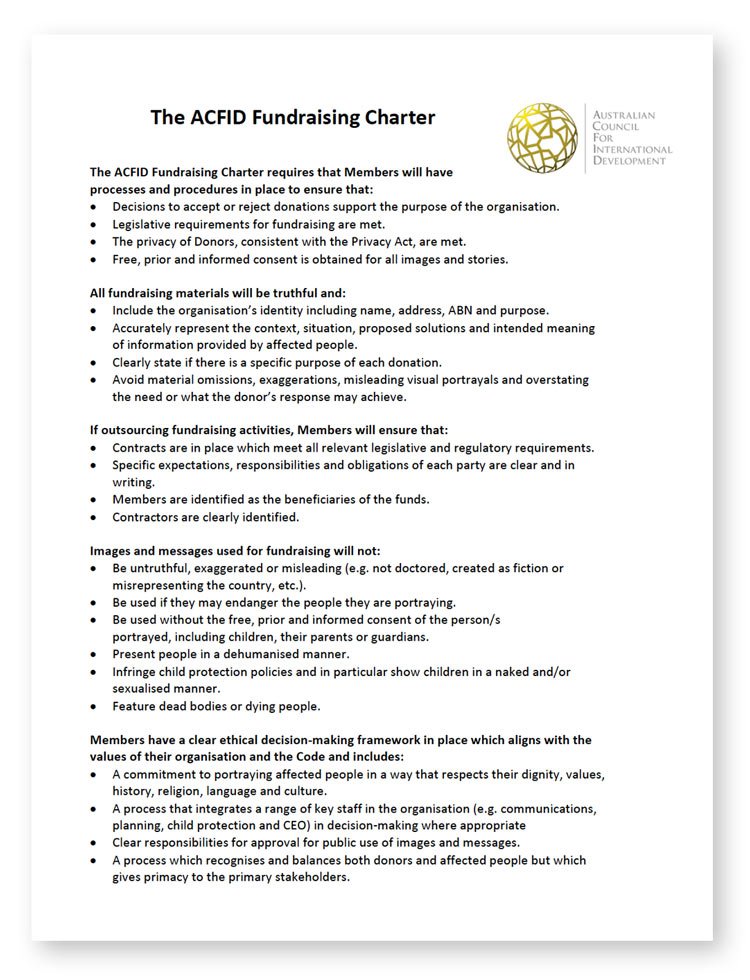Code of Conduct Spotlight on Quality Principal 8 – Resource Management
All charitable organisations aim for ongoing sustainable revenue streams, including from transparent and accountable private fundraising. This ensures that our charities are impactful and trusted by the public, and that the charitable sector can flourish in the long term.
The ACFID Code of Conduct is a gold standard in transparency and accountability, and ultimately seeks to build the credibility of the sector overall. The ACFID Code of Conduct provides our donors with a high level of comfort that their investments are making a difference in the right places.
In our ACFID Code of Conduct, ethical standards of fundraising are covered by Quality Principle 8 (Resource Management). The ACFID Fundraising Charter, which forms part of compliance indicator 8.1.2, provides clarity on the sector’s expectations for fundraising compliance and guidelines for building transparent and accountable relationships with both donors and beneficiaries.
Approaching the Code’s Fundraising Charter
The ACFID Fundraising Charter works to ensure that the public trusts fundraisers to raise and distribute donations in an ethical and accountable manner.
The Code requires all members to abide by the Fundraising Charter, which covers:
- Fundraising compliance
- Donor privacy
- Policies for accepting and rejecting donations
- Outsourced fundraising agencies
- Images and messages used for fundraising
- Ethical decision-making and approval processes
Approaching the Code’s Fundraising Charter
The ACFID Fundraising Charter works to ensure that the public trusts fundraisers to raise and distribute donations in an ethical and accountable manner.
The Code requires all members to abide by the Fundraising Charter, which covers:
- Fundraising compliance
- Donor privacy
- Policies for accepting and rejecting donations
- Outsourced fundraising agencies
- Images and messages used for fundraising
- Ethical decision-making and approval processes
The requirements of the Charter are also in line with the Code of Ethics and Professional Conduct developed by the Fundraising Institute of Australia (FIA).
However, this element of the Code can present a challenge to some of ACFID’s members. The Code team, which assesses ACFID members’ compliance against the Code, reports that around 10% of members report exceptions against Code clauses 8.1.1 (members have organisational standards for the acceptance of donations) and 8.1.2 (members report their compliance).
Developing a policy for accepting and rejecting donations
We all want robust and transparent relationships with our donors, and we want them to trust that their donations have a positive impact on the world. More broadly, we want to deepen a culture of philanthropy in Australia so that there is greater public trust in charities. The challenge is managing donor expectations and ensuring the best outcomes for beneficiaries.
Clear and succinct policies on the acceptance and rejection of donations empowers an organisation to maintain its independence from donor influences, as well as strengthens donor relationships.
For example, I worked in an Indigenous organisation which held strong to its policy of not accepting donations from sources which came from gambling, alcohol or tobacco – industries which have brought devastation to the communities my organisation served. This policy was endorsed by the board of directors and created helpful guidelines to the fundraising and corporate sponsorship team. In one instance, it made it easy to decline when approached by an alcohol company with a significant offer of support; money can be hard to decline.
Questions to consider when creating a policy on donations could include:
- Is this prospective donor and their values compatible with the mission, vision and cause of your organisation? Will you accept money from a donor whose values do not align with yours and how will you manage any public relations challenges related to the partnership?
- Is the cost of accepting this donation greater than its value? Donors can be demanding and servicing them can be costly – do the terms of the donation leave your organisation worse off?
- Are there any legal implications in accepting this donation?
- Does the donor have real capacity to make the donation or will it leave them vulnerable? This is particularly relevant for small monthly pledge campaign donors who may be acquired through face-to-face fundraising.
- What level of donation requires the board need to approve the acceptance of funds? The board should be aware of larger donors (and where possible, have active relationships with those donors), and where necessary approve the acceptance of funds.
- Will existing donors be upset if we accept this donation? Is there any level of exclusivity?
- What is the process for accepting donations? Will there be a formal agreement with a major donor? What processes are in place for donor servicing and communications? For extra clarity, create a flow chart or map of the processes.
Creating clarity on which donations are acceptable and how you service donors will benefit everyone in your organisation, and help you manage the expectations of everyone.
Staffing the fundraising team
Smaller organisations often rely on a single over-worked individual to manage donations, run fundraising campaigns and manage the administration and compliance of fundraising. Speaking from experience, this role can be relentless and unforgiving.
Fundraising is a hard slog, and the organisations most successful at it are the ones which cultivate a culture of fundraising from the board and CEO to the programming team.
Employing skilled and experienced fundraisers will bring the greatest benefit to an organisation. Fundraisers require finance, relationship management and communication skills to be successful at their jobs. Industry insights suggest that prospective major donors can take as long as four years before they finally donate to an organisation.
More information
ACFID has excellent resources available in the Good Practice Toolkit which outline the requirements for fundraising compliance. More information can also be found in the Quality Assurance Framework. The ACFID Communities of Practice provide opportunities for collaboration and networking.
The Fundraising Institute of Australia offers further resources and training for fundraising staff.

Rebecca MacFarling
Rebecca MacFarling - Communications and Marketing Specialist Rebecca MacFarling holds the specialist fundraising and marketing role on the Code of Conduct Committee. She has spent two decades working as a marketer and fundraiser in both the not-for-profit and corporate sectors. She has recently been the CEO of the Museum of Australian Democracy at Eureka (MADE) on the site of the Eureka Stockade in Ballarat, and previously the Deputy CEO & Head of Fundraising for CUFA, an Australian NGO working on economic inclusion and financial literacy. Rebecca holds tertiary qualifications in politics, management and digital media, and is a member of the Fundraising Institute of Australia. She is also a co-convener of Women in Aid & Development.









